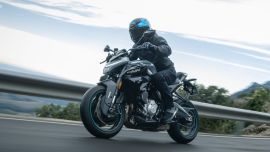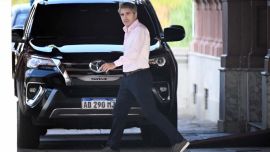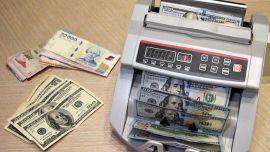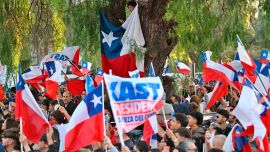This pre-inauguration series on regional trouble-spots is proceeding with the time of origin and the immediacy of the crisis in inverse proportion, which is perhaps an indication of how short a fuse these outbreaks often have. In the last fortnight we have looked at Chile and Bolivia, both right at the top of the news, with Ecuador, today’s subject, before turning our attention to Uruguay (not a trouble-spot but well worth a column with tomorrow’s run-off) and concluding with Peru in the pre-inauguration weekend.
But the temporal sequence has been the exact opposite of this order. This latest spate of crises began in Peru in late September when President Martín Vizcarra dissolved a hostile Congress by decree, before trouble moved north to Ecuador with the backlash against fuel prices hiked at the start of October (more on this below). On October 6, Chile edged up its metropolitan subway fares, the catalyst for a protest which mushroomed from a few hundred students to a million people in less than three weeks. But before the first mass march in Santiago, Bolivia had already erupted in the wake of its highly suspect October 20 elections.
“Put not your trust in princes,” Psalm 146 tells us, and perhaps one lesson from Ecuador for Argentina might be not to put your faith in vice-presidents either (Alberto Fernández, take note!) – including ones in wheelchairs. This in no way refers to the outgoing veep Gabriela Michetti here but to Ecuador’s Lenín Moreno (immobilised since being shot by car thieves in early 1998 with irreversible spinal damage). Vice-president for the first six years of Rafael Correa’s decade in power (2007-2017), Moreno emerged as the successor rather than then-vice-president Jorge Glas because the latter was dogged by corruption charges (including the Odebrecht scandal extending over the entire region), which did not stop Correa from installing him as Moreno’s running-mate (and watchdog). But since becoming president in 2017, Moreno has belied his unusual first name by being far more of a counterrevolutionary than a revolutionary in reversing the populist Correa decade – and just to complete the circle of mistrust in vice-presidents, he saw Glas sent to prison for the next six years on Odebrecht-related charges within five months of their inauguration.
In Argentine terms Moreno would be broadly comparable to 2015 presidential candidate Daniel Scioli here, as the resisted surrogate of a long-serving president unable to clinch another term – with the difference that he won his run-off by 2.3 percent, whereas Scioli lost his by 2.6 percent, as both men had to battle considerable voter fatigue with lengthy regimes. Such regimes – including not only a decade of Correa and 12 years of Kirchnerism, but also over two decades of Bolivarian rule in Venezuela, 14 years of Evo Morales in Bolivia (ended for now) and of the Frente Amplio in Uruguay (at stake tomorrow) and 13 years of the Partido do Trabalho in Brazil – are often simplistically grouped together under the blanket term of “populist,” but all they really have in common is their length. Thus we saw last week how the undeniable authoritarian streak of “Ego” Morales and his highly populist rhetoric were accompanied by economic and fiscal policies which were far from irresponsible. By the same token, Correa’s anti-imperialistic posturing becomes relative when it is considered that he maintained the United States dollar (adopted at the turn of the century) as his country’s currency throughout his decade in power – his economics doctorate comes from Illinois, it might be added. Furthermore, no Latin American president has done more to upgrade education than Correa even if the progress lies more in expanding access than improving quality.
In the 30 months of his presidency Moreno has clashed with the Correa heritage from the start, confronting first the policies and then the man himself. He questioned Correa’s pursuit of state domination, seeking dialogue with opposition leaders, the private sector and the press, while promoting policies of fiscal austerity and a more open economy. Moreno gave high priority to fighting corruption, which also helped him to dump his pro-Correa vicepresident quickly. Apart from general policy, two highly symbolic moves flagged the change of direction. One was exit from both the Venezuelan-led ALBA and Unasur in the last 15 months, even though Quito was the capital of the latter (this entailed sending the statue of the late Néstor Kirchner into storage, among other things), while seeking entry into the Pacific Alliance. The other was ending seven years of asylum for WikiLeaks hacker Julian Assange at Ecuador’s London Embassy last Easter. Almost from the start, all this was criticised by Correa from the distance of his wife’s Belgian homeland where he moved in mid-2017.
The fuel price hikes sparking last month’s unrest need to be placed in a broader context. Pursuing a broadly similar pro-market path to Mauricio Macri here with the same preference for debt over deficit equally led Moreno to the International Monetary Fund once global credit tightened – last February Moreno signed an Extended Fund Facility agreement for US$4.2 billion (topping US$10 billion with World Bank and other loans). Freeing petrol and diesel prices to approximate international levels last month (which had actually started 15 months ago around the time Ecuador left ALBA in August, 2018) was thus part of a broader austerity package which sparked the protests, not just the withdrawal of fuel subsidies, although these alone saved the government some US$1.5 billion at the expense of the consumer.
The backlash plunged Ecuador into total chaos for 10 days or more. Following hundreds of arrests amid widespread looting, Moreno decreed a state of emergency on October 4, deploying the Army, but nothing could restore order and he switched the capital to Guayaquil (even with more violence there than most cities), leaving Quito under total curfew for at least five days. Despite vowing never to yield, Moreno was obliged to start negotiating with indigenous groups by October 13, finally backtracking on the notorious Decree 883 to scrap fuel subsidies.
Today Ecuador is off the international radar but these negotiations continue over other austerity sacrifices with Decree 883 now repealed. These negotiations may not stop at the relationship with the IMF but might even challenge a dollarisation now approaching two decades – a dollarisation more explicit than Argentina’s with the greenback actually the currency.
Straddling the Equator, Ecuador is a small country (although
not as small as you might think, 17 million people, only a million
less than the combined populations of Bolivia and Paraguay) but
has its lessons to teach. Next week an even smaller country – Uruguay voting tomorrow. related news



















Comments